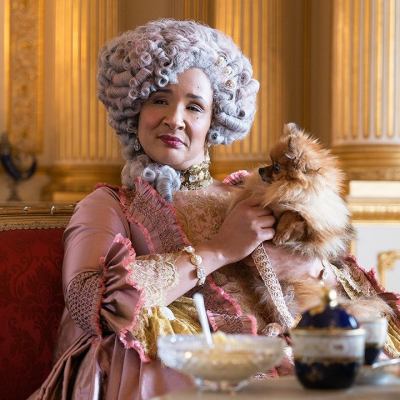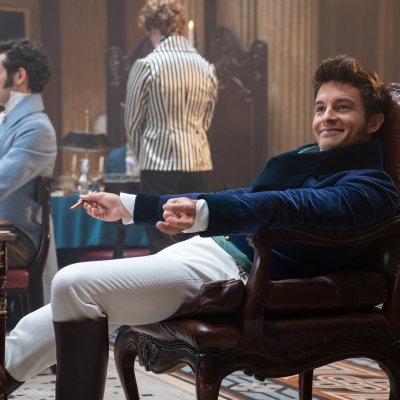Bridgerton: Let’s Talk About Sex Education, Baby
This Bridgerton article contains MAJOR spoilers for Season 1, including the ending.
If you think our sex education could be better today (which you should), then Bridgerton‘s depiction of Daphne’s pre-marital lack of knowledge around sex may astound you. In the first season of the delightful romance drama, Daphne has to find out about masturbation from Simon and heads into her wedding night knowing next to nothing about what might happen between two adults in lust, aside from the fact that it has something to do with the act of having children. Later, Simon keeps the details of his “inability” to have children from his new wife much longer than he could have if Daphne had a better understanding of procreation.
Elsewhere on the show, Penelope Featherington and Eloise Bridgerton put their considerable minds to the task of finding out how babies are made so they can avoid getting pregnant before marriage—a valid question and concern for women of any era. Unfortunately, the closest they get to answering it is: women get pregnant because of love, which is not very helpful. (Bet you’re feeling pretty lucky to have Google right about now.) Is this level of ignorance historically accurate? Let’s dive into the real history of sex education in Regency-era England to find out.
The first season of Bridgerton is set in early 19th century London, which falls during the Regency sub-period of the Georgian era. While many think of old-time England as a repressive place, that stereotype comes more from the Victorian era, which followed the Georgian era when Bridgerton is set, and was notoriously repressive when it came to matters of sexuality and “morality.” The Georgian era was (generally) less conservative. As historian Faramerz Dabhoiwala puts it in his book Origins of Sex: A History of the First Sexual Revolution (via The American Conservative), the 18th century urbanization of England (by 1800, more than one million people lived in London) led to “more opportunities for sexual adventure,” and an increase in pre-marital and extramarital sex. By 1800, almost 40% of brides getting married were already pregnant, and about 25% of first-born children were born out of wedlock.
“We know that Regency society is a very bawdy society, generally,” Bridgerton historical consultant Hannah Grieg told the Chicago Tribune. “Extramarital sex is no longer illegal, most adult consensual sex is within the law, there’s a very open culture of prostitution in London. We get celebrity courtesans and mistresses.”
That being said, just because society is free for some, doesn’t mean it is free for all. England circa 1813 had its own share of socially-constructed ignorances and, as with today, one’s access to sexual education varied based on things like gender, class, and location. In Bridgerton, this kind of difference is depicted in instances like Marina knowing much more about sex and pregnancy than Daphne does before marriage. Presumably, that is partially because she has already had an affair and become pregnant before she even comes to London, but it is also because her slightly lower class (and childhood on a family farm) has not meant the same degree of social shielding as Daphne. That said, Marina presumably had little education or knowledge about birth control and, as we see later in the season, does not have the necessary knowledge (or access to resources) to effectively terminate her pregnancy.
“There would have been nothing in the way of formal sex education,” Lesley A. Hall, a historian of gender and sexuality, told the Tribune. “Mothers might have given some premarital counsel to daughters, but although it almost certainly wasn’t actually ‘Close your eyes and think of England’ it may not have been much more illuminating.”
And, as with today, most freedoms in Georgian-era England benefitted the white, heterosexual, rich men first, most, and sometimes to the exclusion of all others. In Bridgerton, we see a stark difference between what is socially acceptable for Anthony vs. what is socially acceptable for Daphne. Anthony carries on a sexual affair with Sienna and, though he doesn’t particularly what his family to find out, it would not ruin him. For Daphne, however, merely being alone with a man who is not family could ruin not only her prospects, but the prospects of her sisters, as we see happens with the unmarried Bridgerton girls when Marina’s pre-marital pregnancy is made public.
Obviously, Bridgerton is not going for total historical accuracy. As with all period pieces, the story is as much if not more so about now than it is about the time in which it is set. Modern viewers are not watching Bridgerton for an education about the past (nor would they, on the whole, get one); they are watching it as a cathartic and escapist romp, which also has incredible social value.
So what does Bridgerton‘s treatment of sex have to say about today? That is up for interpretation, of course. For me, it is an exaggerated depiction of some of the struggles and joys of contemporary womanhood, in particular a denouncement of all of the decisions about our bodies and our futures that are still kept from us. Here (and in some more obvious ways), it is represented as various female characters’ ignorance around sex, a subject that is kept from them not only by the men in their lives but, in some cases, by other women upholding the patriarchal norms. Daphne herself realizes she has been one of these women when her own experiences lead her to see Marina in a new light. She finds empathy for Marina, whom she rightfully views as another fierce survivor of a social labyrinth designed for men—a girl punished for seeking out pleasure, in a way that men are not for doing the same.
Bridgerton takes on those gender-driven constraints and, over the course of a season, has its many women characters rail against them, not only pointing out their absurdities but finding ways to work within the patriarchal structure to find power in pleasure. No, I am not talking about the controversial scene in which Daphne forces Simon to release inside of her, which has nothing to do with pleasure and everything to do with power. I am talking about Daphne masturbating for the first time, alone in her bed, with nigh a man in sight (though certainly one in her erotic fantasy), for no one’s pleasure but her own. Or on her early honeymoon with Simon, enjoying all of the sex, depicted as just as eager for the rendezvouses as her husband.
“I refer to this season as ‘the education of Daphne Bridgerton,’” creator Chris Van Dusen told the Chicago Tribune. “She starts out as this young innocent debutante who knows very little of love. And she knows nothing of sex. And over the course of the series we watch her transform entirely.”
Knowledge really is related to power and, in Bridgerton, we see much of that accumulation of knowledge takes place in the bedroom, and much of that accumulation of power represented through sexual pleasure. Season 1 is the story of Daphne learning about her own body and its capacity for pleasure regardless of its service to men. After an adolescence of enforced ignorance, Daphne is finally given the knowledge and space to explore her own sexual desire. The fact that it comes through her relationship with Simon is one of the reasons why their romance is so damn sexy—it’s so much about Daphne’s pleasure, even when it isn’t about her happiness.
The post Bridgerton: Let’s Talk About Sex Education, Baby appeared first on Den of Geek.
From https://www.denofgeek.com/tv/bridgerton-the-real-history-of-sex-education-in-regency-england/



